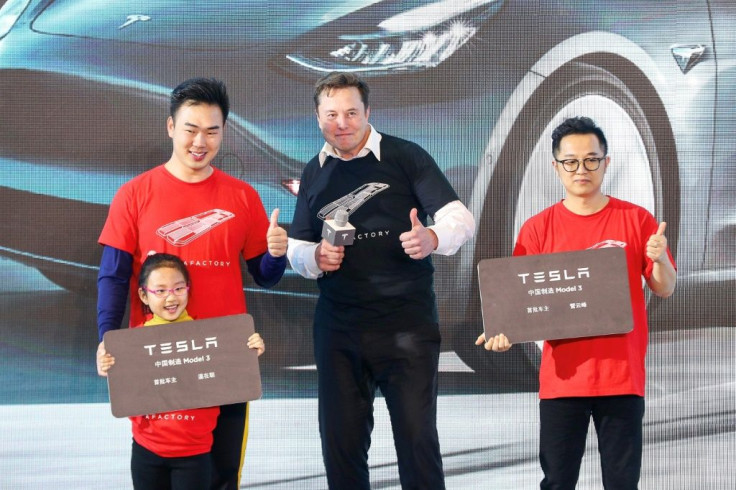Tesla Falls Back To Earth, But Some Analysts Worry Stock Is Overvalued

KEY POINTS
- Tesla shares have surged 326% since last June
- Tesla's gigafactory in Shanghai has been shut down due to coronavirus
- Analysts think Tesla shares are fundamentally overvalued
Shares of electric carmaker Tesla (TSLA) dropped 17.2% on Wednesday after enjoying an impressive rally that saw the stock surge an extraordinary 70% in the last 30 days.
But on Wednesday, Tesla warned that the Chinese government-mandated shutdown of its huge gigafactory in Shanghai due to the coronavirus outbreak will impact its first quarter earnings.
Tesla began making its Model 3 cars in Shanghai late last year.
“The proposed delivery [of Model 3 vehicles] in early February will be delayed,” Tesla vice president Tao Lin said. “We will catch up the production line once the outbreak situation gets better.”
Tesla shares reached a record closing high of $887.06 and an all-time intraday high of $968.99 on Tuesday.
Tesla shares have skyrocketed 326% from a 52-week closing low of $178.97 on June 3, 2019.
Now many analysts are concerned by Tesla’s extraordinary appreciation.
Canaccord Genuity downgraded the stock on Wednesday to “hold” from “buy” citing that after its “electrifying run” there is now a “balanced risk reward for investors to lock in profits.”
Canaccord analysts led by Jed Dorsheimer further warned that Tesla faces a serious challenge in China where the coronavirus outbreak has shut down its Shanghai factory.
“Given the 3,000-per-week China Model 3 production expectations in a country that remains on lockdown, we feel a reset of expectations in [the first quarter] is likely and thus needs to be reflected in the valuation,” the Cannacord analysts said. "Just as we observed a clear buy signal coming into 2020, we see the risk of China's coronavirus as a clear headwind to the Shanghai facility, suggesting a more pragmatic position.”
But Dorsheimer maintained his a 12-month price target of $750 on the stock.
Meanwhile, other Wall Street figures were puzzled by Tesla’s massive price surge before Wednesday’s fall.
“While [Tesla’s recently released fourth quarter] results were somewhat stronger than expected, the company’s 2020 outlook for both volume and gross margin was not materially higher than consensus expectations,” said Morgan Stanley analysts led by Adam Jonas. “As such, many investors are struggling to identify a strong fundamental underpinning for the move.”
Jonas also said the stock’s inexplicable price surge has raised “more questions than answers."
Morgan Stanley maintained a “hold” rating on the stock.
Barclays auto analyst Brian Johnson, who is projecting a 65% drop in Tesla shares, said the recent price action of the carmaker reminded him of how Nasdaq tech stocks soared to unsustainable levels in the late 1990s.
Johnson specifically compared Tesla’s recent super run to tech stocks like Qualcomm, Cisco and Oracle – all of which “had parabolic price inflections in late 1999 that ultimately returned to earth by the end of 2000.”
“We continue to believe [Tesla] is fundamentally overvalued,” he added.
VGI Partners Global Investment, an investment management firm based in Australia, was particularly alarmed by Tesla’s huge price spike.
"Do I think that this is an indication of euphoria or an indicator of a party where the punch bowl has been aggressively spiked later in the night?" quipped Robert Luciano, VGI's portfolio manager. "It certainly feels like it. When a market cap of that size can go hyperbolic in a short period of time for no real reason, it is certainly symptomatic of an environment that is not normal."
But VGI also has not shortened the stock (nor has it bought shares) due to the company’s admittedly huge potential in terms of customers.
"Tesla has multiple total addressable markets, and it's founded and managed by a billionaire genius," Luciano said. "We find that a highly difficult combination to short." Luciano added that Tesla could be regarded as a "platform business" since it has multiple businesses, including electric vehicles, energy storage, solar panels.
Still, Luciano explained that VGI didn't own any Tesla shares because "at various points in time, the mathematics and the outlook for the business has made little sense to us," citing, among other things, heavy competition in the electric vehicle market.
However, analysts at Wedbush Securities remained bullish on Tesla and viewed the production slowdown in Shanghai as a “a small speed bump.”
“The current situation is more bark than bite as the aggressive trajectory of [Model 3] production and demand out of Shanghai look very strong out of the gates and the potential to hit [150,000 vehicles] out of this region over the next year still remains intact,” Wedbush said.
Other analysts speculated that Tesla may seek to pay off some of its debt by accessing capital markets.
“Their renewed access to equity capital could reduce their debt load significantly,” said Eric Ross of Cascend Securities, adding that Tesla would be “open to future debt financing with a clean balance sheet.”
Tesla now has a market cap of about $131.2 billion, far ahead of Ford (F), $32.9 billion, and General Motors (GM), $49.8 billion.
Tesla could next challenge Toyota (TM), which currently has a market cap of $202 billion.
Yet, there is a huge discrepancy in these automakers’ sales figures -- Toyota sold 10.74 million vehicles globally last year, while Tesla sold only 367,500.
Interestingly, Saudi Arabia’s sovereign wealth fund unloaded almost its entire stake in Tesla shares last quarter, thereby missing out on the astounding price gains this year.
The Saudi Arabia Public Investment Fund owned only 39,151 shares at the end of 2019, down from a peak of more than 8.2 million shares. At one point, the fund was one of Tesla’s five biggest owners.
Reportedly, Saudi officials have long been irritated by CEO Elon Musk’s public discussions about their holdings of the stock.
© Copyright IBTimes 2025. All rights reserved.





















